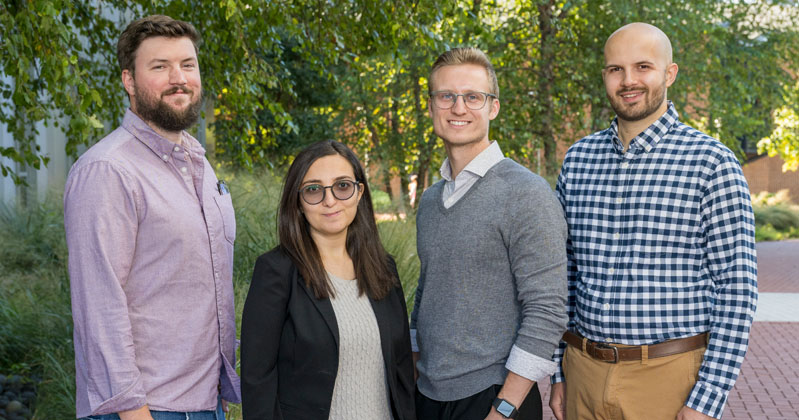Delaware Environmental Institute announces its 10th class of environmental fellows
The Delaware Environmental Institute (DENIN) has selected its 10th class of DENIN Environmental Fellows. These highly competitive and prestigious fellowships offer financial support and professional development opportunities to doctoral students at the University of Delaware whose environmentally relevant research interests demonstrate a clear link to societal need and benefit.
Receiving a DENIN Fellowship eases the financial cost of pursuing a doctoral degree, but just as importantly, it can affirm the recipient’s identity as a new scientist.
“It shows that all the hard work pays off and that someone else also believes in what I’m doing and the importance of it,” fellow Hanan Abou Ali said.
Jeanette Miller, DENIN’s associate director for interdisciplinary programs, said one of DENIN’s goals is to support the development of future environmental leaders.
“Since 2014, DENIN has supported 49 doctoral fellows, and we are proud to see them moving on to excellent positions at universities, in industry, at government agencies such as the EPA and NOAA, and in environmental nonprofits,” she said.
Four recipients were chosen this spring following a rigorous selection process that includes a written research proposal and a research presentation for finalists. Besides the intellectual merit of their research proposals, candidates must demonstrate an ability for and commitment to communicating and transferring the benefits of their research to the wider world through collaboration with other fellows.
DENIN Fellows engage the University and local community in environmental topics through symposia, science communications competitions and environmental service projects.
The new fellowships are supported by DENIN and private philanthropy.
DENIN Fellows for 2023–25
Hanan Abou Ali is using remote mapping and machine learning of crop growth patterns in Nigeria to help smallholder farmers optimize crop yield and economic return while minimizing environmental impact. She is working toward a doctoral degree in geography and spatial sciences with her doctoral adviser, Kyle Davis, in the Department of Geography and Spatial Sciences and Department of Plant and Soil Sciences.
Jason Geiger is developing a more sustainable method of remediating brine spills during natural gas well drilling and operation. He aims to treat the soil in place rather than excavating contaminated soil, taking it to a landfill and then backfilling with fresh soil. Geiger, whose adviser is Paul Imhoff, professor of civil and environmental engineering, is enrolled in the doctoral program in environmental engineering.
With advisers Mark Blenner and Kevin Solomon, both associate professors in chemical and biomolecular engineering, Ross Klauer hopes to identify enzymes and microorganisms that break down common plastics in the guts of mealworm larvae and ultimately recreate that process in a bioreactor with microorganisms. To make the process cost-effective, Klauer is hoping to identify an economically important chemical from mealworm digestion of polyethylene plastic that could be upcycled into perhaps a precursor for a pharmaceutical product or a bioplastic. Klauer is working toward a doctoral degree in chemical and biomolecular engineering.
Michael Powers is pursuing a doctorate in geological sciences with adviser Michael O’Neal, professor of geological sciences. Powers is mapping permafrost in the Andes Mountains of South America using remote sensing satellite data and on-the-ground measures to balance concern for preserving the region’s drinking water reserves with more environmentally friendly copper mining.
More information about the DENIN Environmental Fellows program is available on the program webpage, including profiles of past recipients, information for prospective donors who wish to support the program, and application information in the late spring.
About DENIN
Since 2009, the Delaware Environmental Institute’s (DENIN) interdisciplinary network of researchers on the University of Delaware campus and beyond has been investigating pressing environmental challenges facing our communities, nation and world. DENIN provides academic, government and industrial partners broad access to experts from multiple disciplines in a collaborative effort to advance environmental science, promote environmental education, and devise innovative, multidimensional strategies for environmental sustainability.
Article by Joy Drohan | Photo by Kathy F. Atkinson (featured on UDaily, 11/30/2023)

